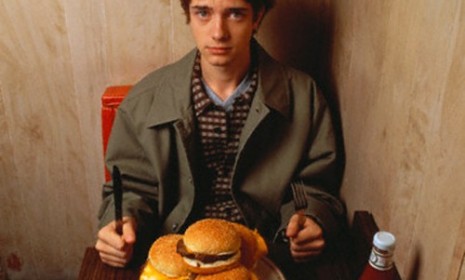Junk food: More addictive than cocaine?
A new study suggests "kicking" narcotics may be easier than breaking a Big-Mac habit. Is it time for "fast food rehab"?

A free daily email with the biggest news stories of the day – and the best features from TheWeek.com
You are now subscribed
Your newsletter sign-up was successful
Could fatty fast foods and sugary snacks be as addictive as a hit of heroin? Yes, say scientists at the Scripps Research Institute, who released a groundbreaking study this week confirming what binge eaters have long suspected — high-fat, high-calorie foods cause profound chemical changes in the brain. Here, a look at the study's findings — and what scientists say people can do to kick their junk addiction.
How was the study conducted?
Researchers divided rats into three groups. All three were given unlimited access to standard rat food. A second group was also given restricted access to "cafeteria-style" foods — cheesecake, fatty meat, sponge cake and chocolate snacks — for an hour every day. The third group was given "unlimited access" to these options.
The Week
Escape your echo chamber. Get the facts behind the news, plus analysis from multiple perspectives.

Sign up for The Week's Free Newsletters
From our morning news briefing to a weekly Good News Newsletter, get the best of The Week delivered directly to your inbox.
From our morning news briefing to a weekly Good News Newsletter, get the best of The Week delivered directly to your inbox.
What happened to the fat-fed rats?
The rats whose fat intake was restricted demonstrated no "averse effects," but the rats given free rein to binge on junk food quickly became obese. Over time, not even even physical pain could dissuade the fat rats from haunting the cheesecake buffet: "When researchers applied an electric shock to the rats' feet in the presence of food, the rats in the first two groups were frightened away. But the obese rats were not. "Their attention was solely focused on consuming food."
Why did the obese rats act so differently?
Researches say their brains' chemical makeup had changed. The fat rats' brains needed more food to trigger the release of Dopamine, the brain chemical that triggers pleasure and comfort.
A free daily email with the biggest news stories of the day – and the best features from TheWeek.com
How is this similar to drug addiction?
The same phenomenon leads drug abusers to up their dosage. The initial "high" overstimulates the production of dopamine. After this first rush of euphoria, however, drug users (and over-eaters, scientists theorize) develop a pleasure tolerance, and consume increasingly large amounts in hopes of achieving the same "high," even when they know it's excessive.
Did the fat-fed rats regain healthier eating habits after the study?
Not right away. "When we removed the junk food and tried to put them on a nutritious diet — what we called the 'salad bar option' — the rats simply refused to eat," said Dr. Paul Kenny, a neuroscientist who led the study. "They basically starved themselves for two weeks."
Aren't the scientists who published this study giving fat people a "get out of jail free" card?
No, say scientists. While this study gives the medical community valuable insight into the "genetic" basis for overeating (people with low dopamine receptors are more susceptible to all types of addiction), "environmental factors, and not just genes" are also involved. Like drug users, over-eaters can overcome their addictions, though the brain makes the job more difficult.
How could this study alter weight loss efforts in the future?
Current dieting methods — calorie counting, going "cold turkey" and simply "developing self-control" — might soon be antiquated. Instead, doctors may start exploring drug-addiction therapies (yes, including "junk food rehab") to treat obesity. Some are even suggesting that scientists start searching for a "chemical cure" to food addiction, like a pill to blunt the pleasure of starchy carbohydrates or unrefined sugar.